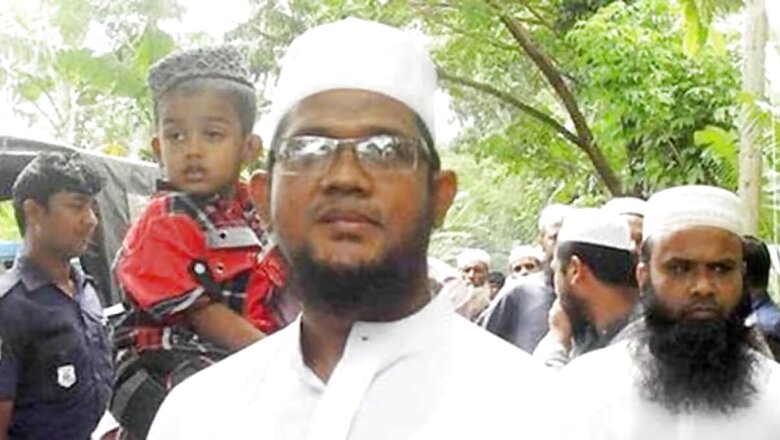
views
Jasimuddin Rahmani, a radical Islamist preacher notorious for his hate-filled sermons advocating jihad, is back to haunt the liberal and democratic forces of Bangladesh and beyond. Rahmani, also the spiritual leader of Bangladesh’s Ansarullah Bangla Team (ABT) terrorist group, and closely linked to al-Qaeda in the Indian Subcontinent (AQIS), presents a significant security challenge not only for Bangladesh but for the entire region. His radical Islamist views, ties with international jihadist networks, and recent rhetoric against India after being released from prison, mark a critical juncture for the region’s stability.
Rahmani’s ideological influence, operational connections, and inflammatory rhetoric against India and just ousted Hasina-led secular government in Bangladesh position him as a chief extremist provocateur who can incite violence with his hate sermons during Friday gatherings in mosques, or through virtual media.
Anti-India Rhetoric
Rahmani’s release in August 2024, following the military-backed interim government’s rise to power, signals a dangerous shift in Bangladesh’s counterterrorism landscape. His recent video message targeted not only the democratically elected government of Bangladesh but also neighbouring India. Rahmani called on the West Bengal chief minister, Mamata Banerjee, to declare independence from “Modi’s rule” and issued inflammatory threats of partitioning India with “Islamist flags hoisted over Delhi.” These statements highlight his capability to fuel regional tensions, especially given Bangladesh’s historical ties with India’s Northeastern regions.
Rahmani’s specific mention of the Siliguri Corridor (often referred to as the ‘chicken’s neck’) in his threats underscores his potential to incite or support terrorist activities aimed at disrupting India’s Northeastern connectivity. Such rhetoric isn’t, or may not be, loose talks. It’s a strategic invocation of a sensitive region where India’s vulnerability could be exploited, particularly if insurgent or Islamist groups in Kashmir or the Northeast find common cause with Rahmani’s Ansar al Islam/ABT’s ideals. His willingness to align with China and Pakistan, as implied in his message, further amplifies the threat of a broader geopolitical entanglement in the region.
Influence over Extremism in Bangladesh
The Shahbag protests of early 2013 are etched in public memory as a violent turning point in Bangladesh’s ideological conflict. These protests revealed previously unknown extremists and exposed a larger conspiracy against the country’s secular foundation. Fringe groups supported by Qawmi madrasas—unregulated Islamic seminaries—emerged into the spotlight. Among them was the ABT, a network led by Rahmani, Mufti Abdullah Ashraf, Tamim Al Adnani and Syed Ziaul Haque Zia.
Alongside Hefajat-e-Islam (HeI), a Chittagong-based Islamist coalition that spearheaded the “defend Islam” movement then, Rahmani and ABT’s extremist nature became apparent when ABT members murdered blogger Rajib Haider during the protests. Haider had been a key figure in organising the movement that demanded the execution of Jamaat-e-Islami leaders for war crimes committed during Bangladesh’s 1971 Liberation War. Earlier, ABT activists had also targeted another blogger, Asif Mahiuddin, allegedly on Rahmani’s orders. Mahiuddin survived the attack. Five students from North South University (NSU) later confessed that Rahmani had incited them to attack the bloggers. Rahmani admitted to using Friday sermons to speak out against bloggers and atheists.
During the Rajib murder investigation, Rahmani too admitted that his killers might have been inspired by his sermons. During the height of the protests, Bangladesh police uncovered ABT’s existence through jihadist web forums like the Ansar al-Mujahideen portal, which praised ABT members as “Five Lions of the Ummah.” Reports indicate that ABT was founded at NSU in Dhaka and was modelled on the Iraqi al-Qaeda affiliate, Ansar al-Islam.
Jasimuddin Rahmani was arrested on August 12, 2013, along with 30 other ABT members at his brother’s home in Barguna, where they had gathered for a secret meeting. Investigations revealed Rahmani’s open support for the Taliban and Al-Qaeda, reflected in his writings and speeches. ABT also drew inspiration from Anwar al-Awlaki, the late ideologue of Al-Qaeda in the Arabian Peninsula (AQAP). Rahmani further gained the support of Al-Qaeda leader Ayman al-Zawahiri, who called for an uprising in Bangladesh against the government and secular forces, urging the public to rally behind “true Islamic scholars.”
ABT was banned in May 2015 and blamed for killing and injuring at least 15 atheists, educationists and progressive writers, LGBTQ activists and anti-Islamist bloggers. It had released a list targeting Bangladeshi-origin authors staying abroad, including nine bloggers in the UK, seven in Germany, two in the US, and one each in Canada and Sweden, calling them ‘enemies of Islam’ and ‘agents of India.’
Scholar turned Pro-Jihadist Preacher
A further look into his background reveals how he rose to prominence in the Islamist landscape of Bangladesh. Hailing from Heulibuniya in Barguna, he studied at India’s Darul Uloom Deoband, and Saudi Arabia, before returning to Bangladesh, where he founded the Markazul Uloom al-Islamia seminary near Dhaka, establishing the Ansarullah Bangla Team (ABT).
Rahmani, known for his hateful extremist sermons, wrote over 20 books on Islam and jihad, amassing thousands of followers, some of whom are suspected of engaging in armed jihad abroad. One example is Akayed Ullah, a Bangladeshi national who detonated a pipe bomb in a crowded New York subway passage in December 2017. Ullah was influenced by the sermons and writings of Jasimuddin Rahmani. In 2021, he was sentenced to life imprisonment for acting on behalf of the Islamic State group.
As a khateeb and imam at Hatembagh Mosque, his sermons were rife with jihadist rhetoric, condemning Bangladesh’s secular government. Rahmani and ABT utilised blogs and social media to spread their message in Bengali, Urdu, and Arabic, aiming to radicalise young minds. His arrest in 2013 led to the discovery of jihadist literature and hit lists targeting progressive intellectuals. Despite his imprisonment, ABT continued operating under fugitive Maj Syed Muhammad Ziaul Huq, and Rahmani’s connections to other militant groups like HuJi-BD and Jama’atul Mujahideen Bangladesh (JMB) remain under investigative radar until his release this year.
Challenges for Bangladesh’s Counterterrorism Strategy
The resurgence of Rahmani would definitely reinvigorate the dormant ABT network along with AQIS. His release presents a complex challenge for Bangladesh’s caretaker government and counterterrorism efforts. Under ousted Prime Minister Sheikh Hasina’s government, ABT was banned, and Rahmani was jailed, reflecting a robust counterterrorism posture. However, the military-backed interim government, which facilitated Rahmani’s release, appears to have a different approach, perhaps prioritising political alliances over security concerns.
Rahmani’s return, along with pro-Islamist parties Jamaat-e-Islami and Bangladesh Khilafat Majlish to the fore, could embolden Islamist terrorist groups within Bangladesh, leading to increased terrorist activity and further polarisation within the country and India as well. His rhetoric of mobilising Bangladesh’s “18 crore Muslims” against India also suggests he may attempt to galvanise broader public support for Islamist causes, exacerbating tensions not only within Bangladesh but also in its relationships with neighbouring India.
With the comeback of Jasimuddin Rahmani and the release of other jailed extremist figures, the Mohammad Yunus-led interim government has a challenging task ahead. Perhaps he and his advisors are either unaware or deliberately ignoring the looming extremist threat over Bangladesh and the region. The fact that Rahmani’s release coincided with the interim government’s entry points to possible compromises in Bangladesh’s internal security apparatus. If this trend continues, it could erode the stellar gains made in the last decade in countering extremism.
With a history of encouraging violence against secular voices, Rahmani exemplifies his long-standing antagonism towards Bangladesh’s secular and liberal elements. As an extremist hate preacher, Rahmani has continually railed against the government and non-Islamic figures, advocating for armed jihad as a religious obligation. By targeting progressive intellectuals, bloggers, and secular figures, Rahmani and his gang aimed to undermine the pluralistic values that Bangladesh has worked to uphold since its independence. His ideological commitment to establishing a hardline Islamist state poses a significant threat to the future secular governance of Bangladesh.
Conclusion
For Bangladesh, his release raises concerns about the country’s direction in managing radical Islamism, particularly as Rahmani’s return could signify a shift towards more open expressions of jihadist ideology.
For India, his threats toward the Northeastern region and the Siliguri Corridor are particularly worrisome, as these could reignite tensions in one of India’s most vulnerable Muslim-dominated areas and a porous border. The challenge for Bangladesh and the region will be to contain Rahmani’s influence, both ideologically and operationally. Failure to do so could lead to a resurgence of jihadist activity, fracturing the delicate balance of security in South Asia. For the international community, including the US and India, the rise of figures like Rahmani is a reminder of the persistent threat of Islamist terrorism and the need for coordinated efforts to counter its spread.
The author is executive director, Society for the Study of Peace and Conflict, New Delhi. The views expressed in the above piece are personal and solely those of the writer. They do not necessarily reflect News18’s views.



















Comments
0 comment